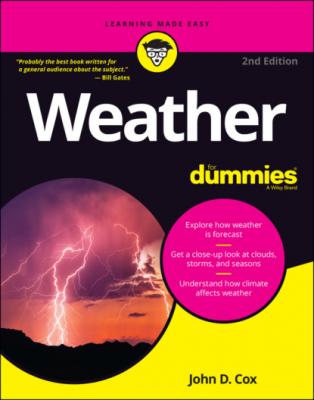Weather For Dummies. John D. Cox
Читать онлайн.| Название | Weather For Dummies |
|---|---|
| Автор произведения | John D. Cox |
| Жанр | |
| Серия | |
| Издательство | |
| Год выпуска | 0 |
| isbn | 9781119811022 |
This gas has no direct effect on daily weather, and most of it gets washed out by rain or snow. But like all greenhouse gases, carbon dioxide has an effect on climate, weather’s long-term patterns. The concentration of carbon dioxide in the atmosphere has been steadily on the rise for more than a century. (Chapter 14 describes how increased concentrations of CO2 have led to some pretty alarming worries about global warming.)
The bit particles
On the surfaces of these tiny floating bits of stuff, water vapor condenses to form clouds. In fact, my people at the Go Figure Academy of Sciences tell me that you cannot get a cloud to form naturally without this microscopically small flotsam and jetsam up there. Without clouds, of course, there would be no precipitation, and without precipitation — well, you get the picture. There would be no Weather For Dummies!
The atmosphere is carrying tons of aerosols, such things as soot and ash from fires, dust kicked up by winds, salt from sea spray, and large quantities of ash and droplets of gases from the eruption of volcanoes. In fact, the gigantic eruption in 1991 of Mt. Pinatubo in the Philippines threw so much material high into the atmosphere that it changed the short-term global climate. Aerosols from this single volcano filtered out sunlight, causing average surface temperatures in the Northern Hemisphere to decrease by nearly 2 degrees. This worldwide cooling effect lasted nearly two years.
On the downside, industrial processes and gasoline engine combustion releases enormous quantities of aerosols, which is responsible for the formation of smog in urban areas. Chapter 14 describes these and other air-polluting effects of aerosols, including acid rain.
How high the sky?
There is no well-defined upper boundary of the atmosphere (see Figure 3-9). It just gets thinner and thinner and thinner. It’s like the thin skin of a peach — clearly defined on one side where it covers the fruit and then fuzzy on the other.
FIGURE 3-9: Here is a map of the atmosphere’s different layers.
You could say that the atmosphere extends roughly 80 miles up, because a few molecules of the lighter gases like helium and hydrogen are still drifting around up there. But 99 percent of Earth’s sky stuff is below the top of the Stratosphere, 30 miles in the sky, and 80 percent of it is in the lower layer, the 10-mile-thick Troposphere. And as far as weather is concerned, and as far as breathing is concerned, you and I are out of business at the top of the Troposphere.
Конец ознакомительного фрагмента.
Текст предоставлен ООО «ЛитРес».
Прочитайте эту книгу целиком, купив полную легальную версию на ЛитРес.
Безопасно оплатить книгу можно банковской картой Visa, MasterCard, Maestro, со счета мобильного телефона, с платежного терминала, в салоне МТС или Связной, через PayPal, WebMoney, Яндекс.Деньги, QIWI Кошелек, бонусными картами или другим удобным Вам способом.
